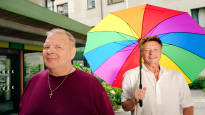– Welcome, welcome, skål på er, cheers!
Iloinen’s bubbling wishes merge into a jumble of Finnish and Swedish on the roof terrace at Stockholm’s Gärdet. There is enough reason to celebrate for the whole year now that Europe’s first residential unit for rainbow seniors, Regnbågen (Finnish: Rainbow) is celebrating its first anniversary.
Matti has arrived at the party with his boyfriend, but doesn’t want to appear with his full name because of his children. At the same time, he summarizes why Regnbågen is an important place for its residents.
Homophobia has not disappeared from the world, on the contrary. It can also be seen in elderly care if the nursing staff is incompetent and treats rainbow people with prejudice or even fear.
We will return to Stockholm soon, but first we will visit Finland and Iceland for a while.
Hate, violence and persecution
– Only because he had a rainbow ribbon around his neck, Hartikainen says.
It was a gathering of Nordic rainbow organizations, the theme of which was especially the increased hatred, violence and hardened speech towards rainbow people in the Nordic countries.
A disease still in the 1980s
A longtime resident of Regnbågen in Stockholm Petri Hämäläinen illustrates the historical dimension of homophobia by reading a passage from a Red Cross book from 1932. It lists various diseases, including homosexuality.
– “Individuals with such an abnormal sex drive are considered psychopaths… overemotional and psychologically unstable,” Petri reads and laughs dryly.
In Finland, homosexuality was classified as a disease until 1981 and in Sweden until 1979. The criminalization of homosexual acts was removed from the penal code in Finland in 1971, but in Sweden much earlier, already in 1944.
Orvokki Hyvönen says that he left Finland in 1957 and lived in Sweden since then.
– It was difficult in Finland precisely because I am… from our country… or because I belong to gays. That was hard. It was so much easier here. It’s good to live here, says Orvokki.
The return of intolerance
Founder of Regnbågen Christer Fallman reminds that the tightening discussion atmosphere is reflected in tolerance throughout society.
– I personally want to grow old in a safe environment, where the people who take care of me understand and accept me as I am, he reflects.
– I know that other big cities would also like this type of living. I wish everyone could find a safe home for their old age, both in Sweden and in the whole world, Christer dreamed on the eve of Regnbågen’s tenth anniversary.
“This is a safe place”
English born Stuart Ward and Swedish Börje Bergh have moved to Regnbågen only last year after spending several years in, among other places, Thailand.
The couple also has a personal theme for the celebration. Let them tell you for themselves:
Stuart and Börje both say that living with like-minded people brings security. They believe that everything will be fine as long as the health is in order, but being at the mercy of others worries men.
Homophobia can also occur among medical staff.
– We are fighting for home care staff to be trained to understand that we are seniors among others and that homosexuality has no meaning in that context, says Stuart.
From Tornionjokilaakso Anders Niska has lived in Regnbågen for eight years:
– This is a safe place. Here there is no need to explain to people who I am and we can be who we want to be. The feeling that we are normal people, even though we have this “problem”. We have a good time, he sums up.
In Stockholm, saedenkaarivää owns 28 rental apartments, studios, two-bedrooms and three-room apartments on the three top floors of a senior building. There are almost 300 people in line for them.
One of those waiting in line was born in Kokkola in 1948 Hannele Hakuntiwho has lived in Sweden since the 1970s.
– I’ve been in line for ten years and now I’m number 20. I’ll move here as soon as I get my turn, he says.
A criminal until adulthood
In Finland, rainbow seniors’ dreams of owning their own house are not progressing.
Risto Hartikainen estimates that there are up to a hundred thousand rainbow seniors in Finland, if all those over 50 are included. Many of them have experienced a time when homosexuality was classified as a disease and prohibited by law.
– I was a criminal until I came of age, Risto recalls his own youth.
What if he himself sinks so deep into his memories that he thinks he’s a criminal again?
Hartikainen has been in contact with several big cities in order to also get housing like Regnbågen for Finnish rainbow seniors.
– The matter is not progressing in any direction. Now that the welfare areas are under construction, there just isn’t enough time and interest, he says.
Friday doc: Rainbow Seniors now in Arena:
Perjantai will discuss homophobia on Friday 1 December. What is scary about being gay? Sean Ricks’ guests are influencer Eino Nurmisto and Sateenkaariseniorit ry chairman Risto Hartikainen. Friday doc: Rainbow seniors. TV1 and Areena at 21:05.
